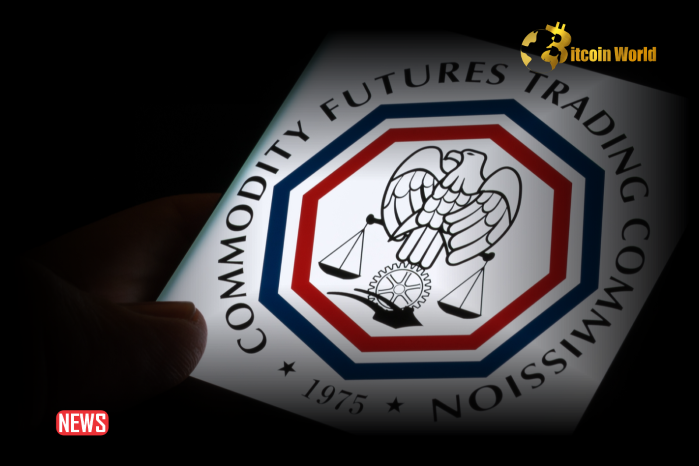Are you concerned about the rising tide of scams in the digital asset world? You’re not alone. As more people dive into cryptocurrencies and digital assets, so does the opportunity for fraudsters. But there’s good news: watchdogs like the Commodity Futures Trading Commission (CFTC) are stepping up their game, and they’re relying on everyday individuals to help them.
In a recent announcement that sent a clear message to both would-be scammers and potential whistleblowers, the CFTC revealed it had awarded a staggering $1 million to a whistleblower. This hefty payout was for crucial information that led to a successful enforcement action within the digital asset markets.
Why is this $1 Million Whistleblower Award a Big Deal?
This isn’t just about the money; it signals a significant shift in how the CFTC is tackling the burgeoning challenges of digital asset regulation. Here’s why this story matters:
- Digital Assets are a Hotbed for Scams: As CFTC Enforcement Director Ian McGinley pointed out, a growing number of Americans are falling prey to digital asset scams. The complexity and novelty of these markets can make them confusing for newcomers, creating fertile ground for fraudulent schemes.
- Whistleblowers are Key Weapons: The CFTC is increasingly depending on insider tips to uncover wrongdoing. Think of whistleblowers as the eyes and ears on the ground, providing critical information that might otherwise remain hidden.
- Digital Asset Cases are Dominating the CFTC’s Workload: In the last fiscal year, a whopping 50% of the CFTC’s cases were related to digital assets! This statistic alone underscores the urgency and scale of the issue. Furthermore, the majority of whistleblower tips received by the CFTC were also about digital assets.
Inside the $1 Million Case: What We Know
While the CFTC is keeping certain details confidential to protect the whistleblower’s identity and the specifics of the enforcement action, here’s what we do know:
- Tip-Off on Improper Trading: The whistleblower provided previously unknown, highly valuable details regarding improper trading practices in the digital asset market.
- Credible and Specific Information: According to CFTC Whistleblower Office Director Brian Young, the tip was not just any random piece of information. It was “sufficiently specific and credible,” directly contributing to the CFTC’s ability to take action.
- Incentive for Honesty: The CFTC offers a substantial financial incentive for whistleblowers. They can receive between 10% and 30% of the monetary sanctions collected in enforcement actions where their information plays a crucial role. This money comes directly from the CFTC’s Customer Protection Fund, ensuring that wrongdoers, not taxpayers, foot the bill for these rewards.
Why Should You Care About CFTC Whistleblower Awards?
Even if you’re not directly involved in digital asset trading, the CFTC’s focus on this area and the importance of whistleblowers have broader implications:
- Market Integrity: Robust enforcement actions, fueled by whistleblower tips, help maintain the integrity of the digital asset markets. This is crucial for fostering trust and encouraging responsible innovation in the crypto space.
- Investor Protection: Ultimately, these efforts are about protecting investors – you and me. By cracking down on scams and improper trading, the CFTC aims to create a safer environment for everyone participating in digital asset markets.
- Deterrent Effect: Publicly announcing whistleblower awards, especially significant ones like $1 million, sends a powerful message. It deters potential wrongdoers and encourages individuals with inside information to come forward.
Could You Be a Whistleblower?
You might be wondering, “Could I ever be a whistleblower?” If you have knowledge of potential violations of the Commodity Exchange Act (CEA) related to digital assets or other commodities, the answer could be yes. Here are a few scenarios where you might have valuable information:
- Insider Knowledge of Fraudulent Schemes: Do you know about a crypto project that is promising unrealistic returns or engaging in deceptive marketing practices?
- Unreported Market Manipulation: Are you aware of individuals or entities manipulating the price of a digital asset through illegal trading tactics?
- Compliance Violations: Have you witnessed a company in the digital asset space failing to comply with CFTC regulations, such as registration requirements or anti-money laundering protocols?
If you suspect wrongdoing, reporting it to the CFTC could not only be the right thing to do but could also be financially rewarding. The CFTC’s whistleblower program is designed to encourage individuals to step forward and help them protect the markets and investors.
The Future of Digital Asset Regulation and Whistleblowers
The CFTC’s recent $1 million award and Director McGinley’s statements make it abundantly clear: digital asset enforcement is a top priority, and whistleblowers are vital allies in this fight. As the digital asset landscape continues to evolve and mature, we can expect to see:
- Increased CFTC Scrutiny: The CFTC will likely maintain, if not increase, its focus on digital asset markets, actively monitoring for and investigating potential violations.
- More Whistleblower Awards: Given the agency’s reliance on tips and the prevalence of digital asset-related misconduct, we could see more whistleblower awards being issued in the future.
- Evolving Regulations: The regulatory framework for digital assets is still developing. Whistleblower cases and enforcement actions will likely play a role in shaping future regulations and guidelines.
In conclusion, the $1 million whistleblower award is more than just a financial transaction. It’s a powerful symbol of the CFTC’s commitment to policing the digital asset space and a testament to the crucial role of whistleblowers in safeguarding market integrity and protecting investors. As digital assets become further integrated into the financial system, the partnership between regulators and whistleblowers will only become more critical.
What are your thoughts on this story? Do you think whistleblower programs are effective in regulating new and complex markets like digital assets? Share your opinion in the comments section below.
Disclaimer: The information provided is not trading advice, Bitcoinworld.co.in holds no liability for any investments made based on the information provided on this page. We strongly recommend independent research and/or consultation with a qualified professional before making any investment decisions.




